They were six of the toughest men to ever play the game. But with that reputation came countless head knocks – both dished out and received. How do these greats feel about concussion now?
Six of footy’s fiercest players have reflected on their careers during a more violent era as part of a News Corp series on concussion.
They are: Dermott Brereton, Robert DiPierdomenico, David Rhys-Jones, Leigh Matthews, Jim Jess and Matthew Lloyd.
Among the key revelations in interviews, below, are:
BRERETON saying he has regrets over his brutal on-field clashes with the late St Kilda great Danny Frawley.
DIPIERDOMENICO saying his infamous elbow to the face of Essendon’s Alan Stoneham at Princes Park in May 1983 was an “accident”.
LLOYD saying he had no intention of knocking out Hawthorn’s Brad Sewell with a brutal hip and shoulder at the MCG in 2009.
MATTHEWS saying he has always carried some regret over damaging opposition players.
RHYS-JONES saying he played out the 1987 Grand Final with severe concussion – going on to win the Norm Smith medal.
JESS – knocked out cold in a sickening clash with Fitzroy’s Garry Wilson at the MCG in 1982 – saying he was prepared to “paya price” to play in a premiership for his beloved Richmond.
DERMOTT BRERETON, 211 GAMES FOR HAWTHORN, SYDNEY AND COLLINGWOOD (1982-95)
Where is the game at with concussion?
“My observation is that we just need to sit and wait until we learn a lot more. We think we’ve learnt a bit now but, really, in 20 years time, we are going to look back on it and be so much better placed in our ability to identify precisely, the cause and effect. So I would temper my answer to where it is at.
“If you are taking up mixed martial arts, like thousands are around the world and it’s a growing, growing sport and it’s highly-participant and highly-viewed, it’s your choice to make. The idea of that sport is to injure the other person.
“And I still believe it is a choice to play league football. People want to play football and some say, ‘Well they go into it to play football – not to get knocked in the head’. I take that onboard and I understand that, but that is one of the dangers of playing football at the highest level.
“We have a game that is like no other in the world. There is no off-side rule. In America they line up opposite each other and they wear helmets.”
Have you had any cause for concern?
“I had half a dozen calcifications cut out of the back of my scalp and that was just from backmen – and I know Spud (Danny Frawley) did a couple of them – full-blooded, thrusted, clenched-fist punches to the back of my head. But in my view, that is just an inherent risk within our sport.
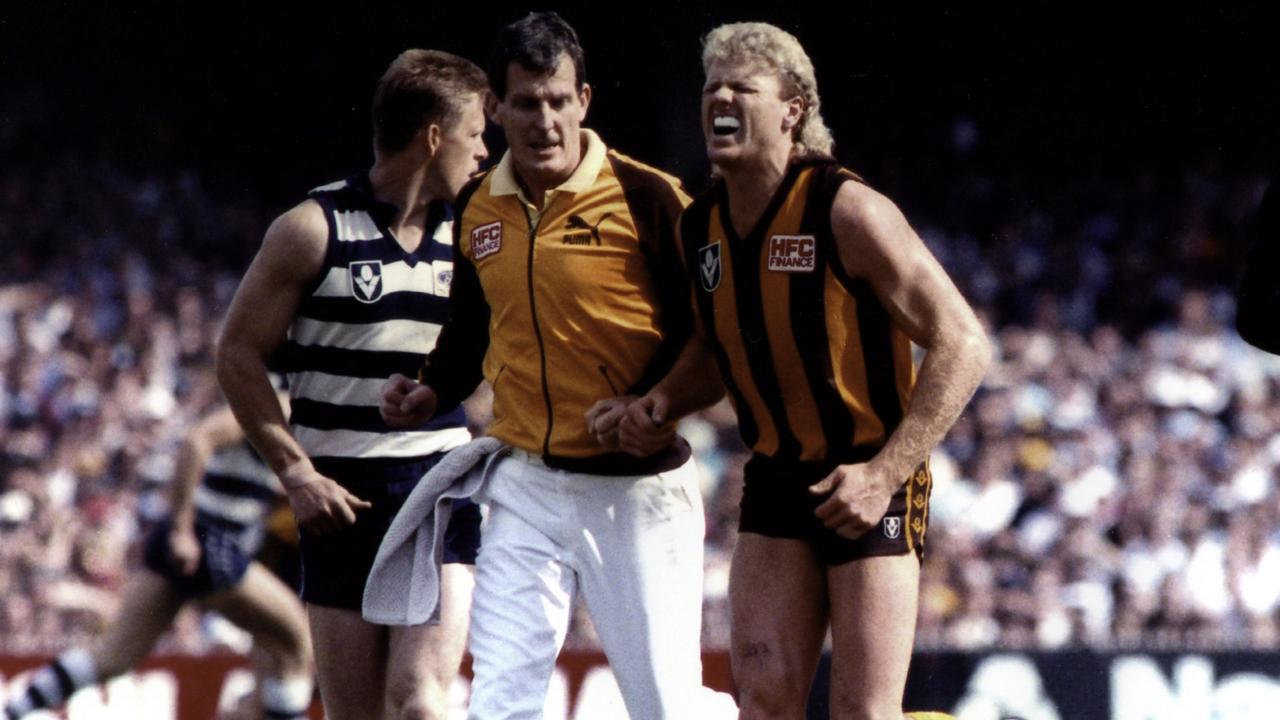
“I have noticed a decline in my cognitive memory, yes. Not dramatically … but my short-term memory is getting worse.”
Brereton estimates he suffered about five major head knocks across his 211-game career.
“I had a hard head. I don’t know whether I ever really got my lights turned off, for what I would consider concussions,” he said.
“There was one time, where Johnny Worsfold got me, I was hemmed in and he ran into me.
“You know when you stare at a ceiling light and you get that yellow orb in the middle of your vision? I had that for the rest of the day. I couldn’t see anything directly down the field. I kept playing but had to learn not to look totally at the footy, so I could actually see it through my peripheral vision.”
Ant regrets?
“We look back at that era and we are proud to have played in it. There was an element of pure courage to actually be out there and we wear that as a badge of honour. It was brutal and I’m a believer that if you sanitise the game any more, people will ultimately start to be completely impervious to what is going on around them. I mean Justin Koschitzke would be the first case that we saw where he felt so protected as a footballer, he had no idea of who or what was coming at him.
“He was playing sport in a naive fashion and we saw what happened to him. Just like when batsmen didn’t wear helmets – they were incredibly aware and cautious of what was around them.
“Now there is a feeling of, ‘I am golden, my head is protected. No one will come at me. I don’t have to worry too greatly about my own safety because the rules will protect me’. I don’t think that is a great way to go about it.
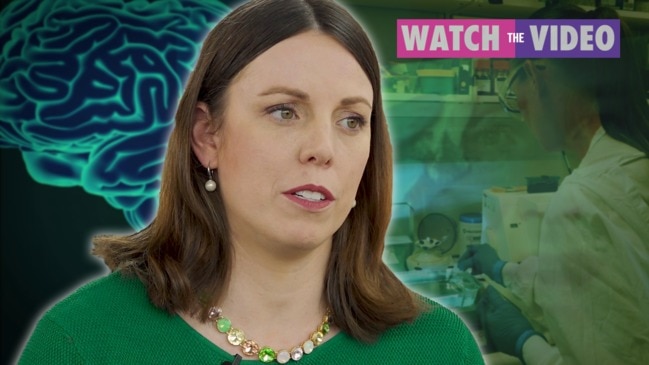
“Players still need to learn the craft – and to be aware – of what is going on around them in terms of threat.”
We know Spud Frawley had CTE and we saw his mental health decline. Is that something that makes you stop and think about the seriousness of this issue?
“Yes. Look, I was one of the ones who whacked Spud. He whacked me and I whacked him back and he went down. Do I regret that that happened? Of course, because that might have been, and quite possibly was, one of the contributing factors to how many times he got hit in the head. We were proud of the era that we played in but we look back at various times, dates and plays that we now wish didn’t happen. Does it make it a scarier review? It brings to light how close to home it is.
“When you see somebody that you have had touch, feel and friendship – and foe – with, because there were times when he (Spud) was a foe, but a respected foe … you realise just how close that touch was to yourself. So, you look back at that time and wish some things had of been different.
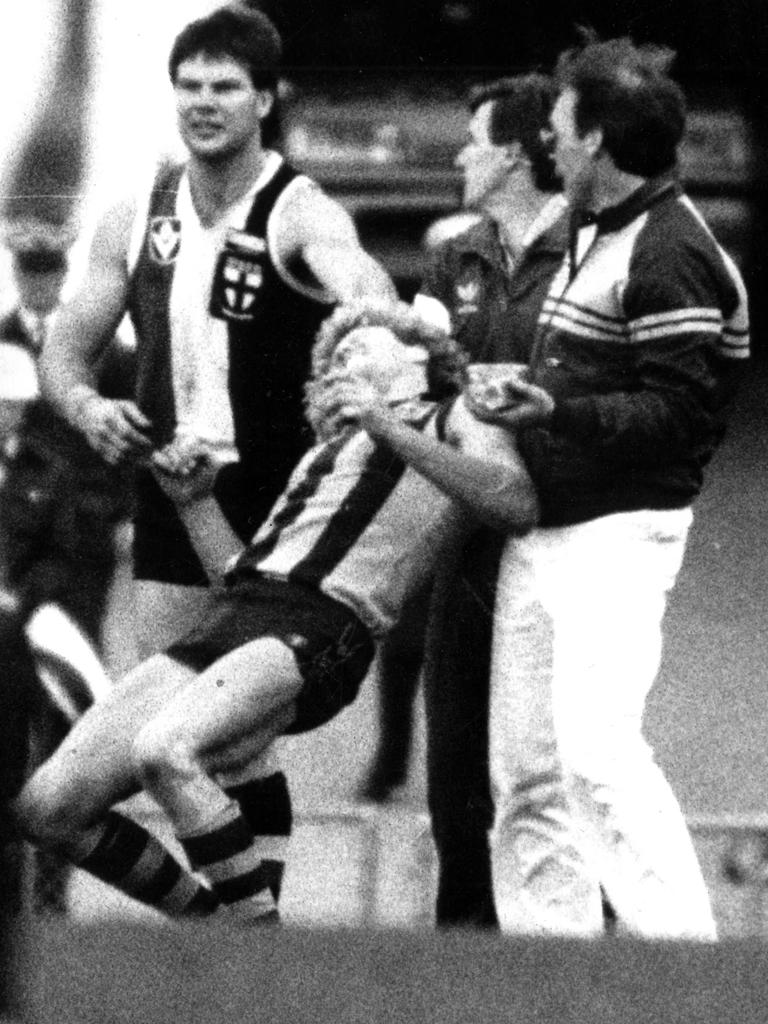
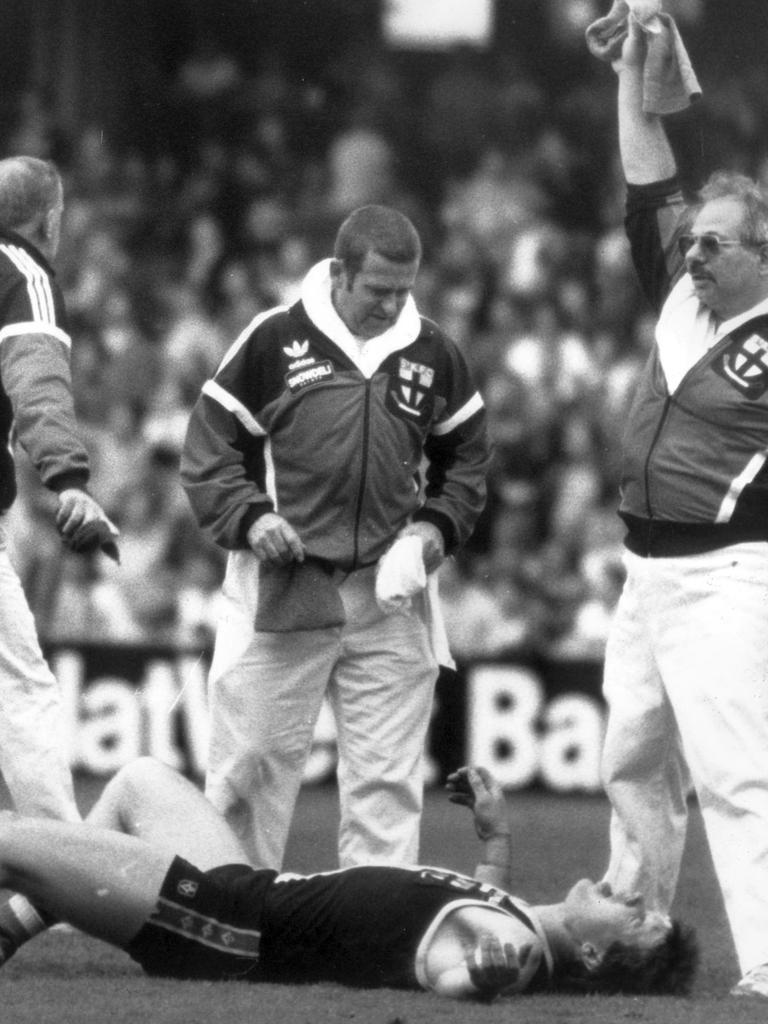
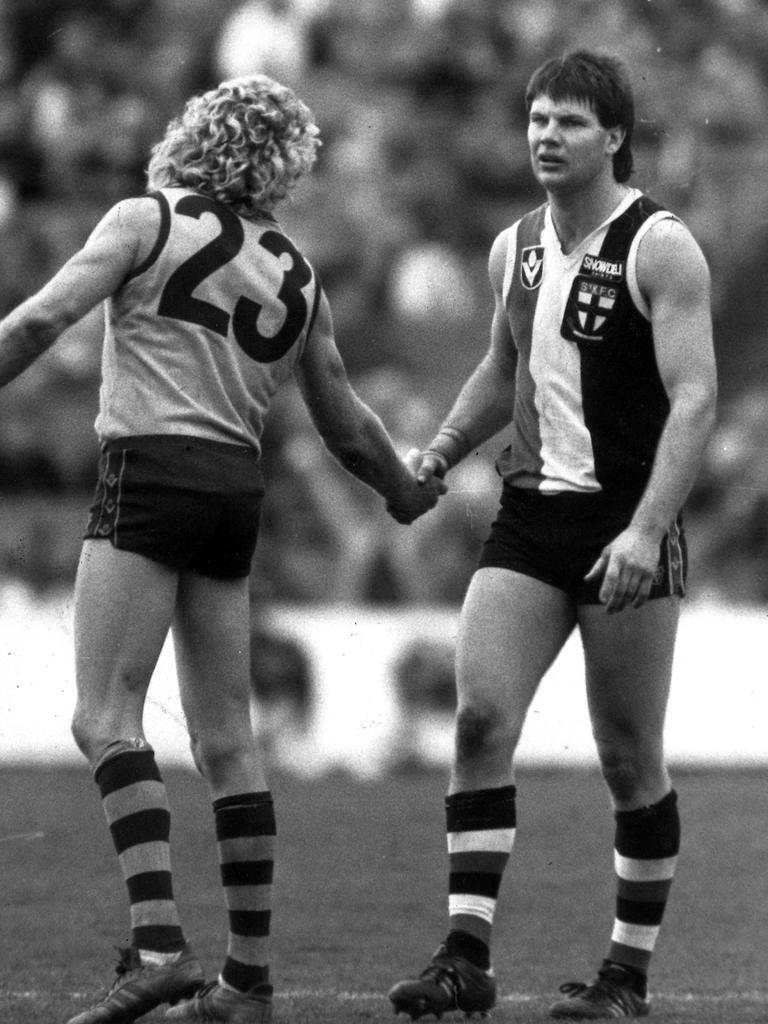
“But the rules were different then …”
Do you worry about the game long-term?
“Absolutely. I couldn’t be more dramatic in my worry for the game long-term. Everything we do now is a roadblock to mitigate litigation. Patrick Dangerfield had no desire to injure that boy (Jake) Kelly. But we have outlawed that action in the hope that it completely takes out head knocks of any confrontational nature – in the hope that someone like Jake Kelly doesn’t come back at us like John Barnes or Johnny Platten … so that we don’t incur severe financial incursions in terms of lawsuits down the track.
“It is coming and so I worry for the sport long-term. I mean, you don’t have these dramatic injuries in soccer, and soccer is thriving numbers-wise.”
What is the solution?
“There has to be an onus on people playing the sport that suggest that they know the risk. It almost has to be a prenup with the sport. Incidental contact in a game that has no off-side rule will always happen.”
DAVID RHYS-JONES, 182 GAMES FOR SOUTH MELBOURNE/SYDNEY AND CARLTON (1980-1992)
You played in a fierce era. Do you look back and wonder about how damaged your head is?
“That’s the stage I’m sort of at. I spoke to Ken Hunter a little while back, which is ironic because Kenny was one of the blokes who knocked me out cold one day up at the SCG with a hip and shoulder – one of the worst ones I copped – and he just mentioned along the way of doing the (brain) testing. And to be perfectly honest, your family and other people sort of start noticing different things. I put a lot of it down to old age and forgetting things but I’m at a stage now where I will go and do the test and find out whether there has been any damage or repercussions from head knocks.”
Do you think there have been?
“Put it this way, I wouldn’t have played footy any differently. You live by the sword, die by the sword. That is the attitude I have always had, but then again, it would be nice to know, if you do find out, that there are some processes you can take to help yourself later in life. I don’t want to be a burden on my family down the track. They are the things you start thinking about.
“I’ll be a little bit surprised if they don’t find something wrong, I suppose, because I copped some knocks.”
Have you had any cause to wonder whether you do have any sort of brain damage?
“I even look back and think to when I was playing junior football and I used to get a lot of blurred vision. I remember copping a head knock in the first five or 10 minutes of the 1987 grand final. Normally, I used to go into a dark room and lie down and you’d be able to get rid of it, but I played on that day. So, there are certain things you start thinking about and wondering about. So, if there is something there, hopefully you can get on some sort of program that can help you in the future.”
Symptoms?
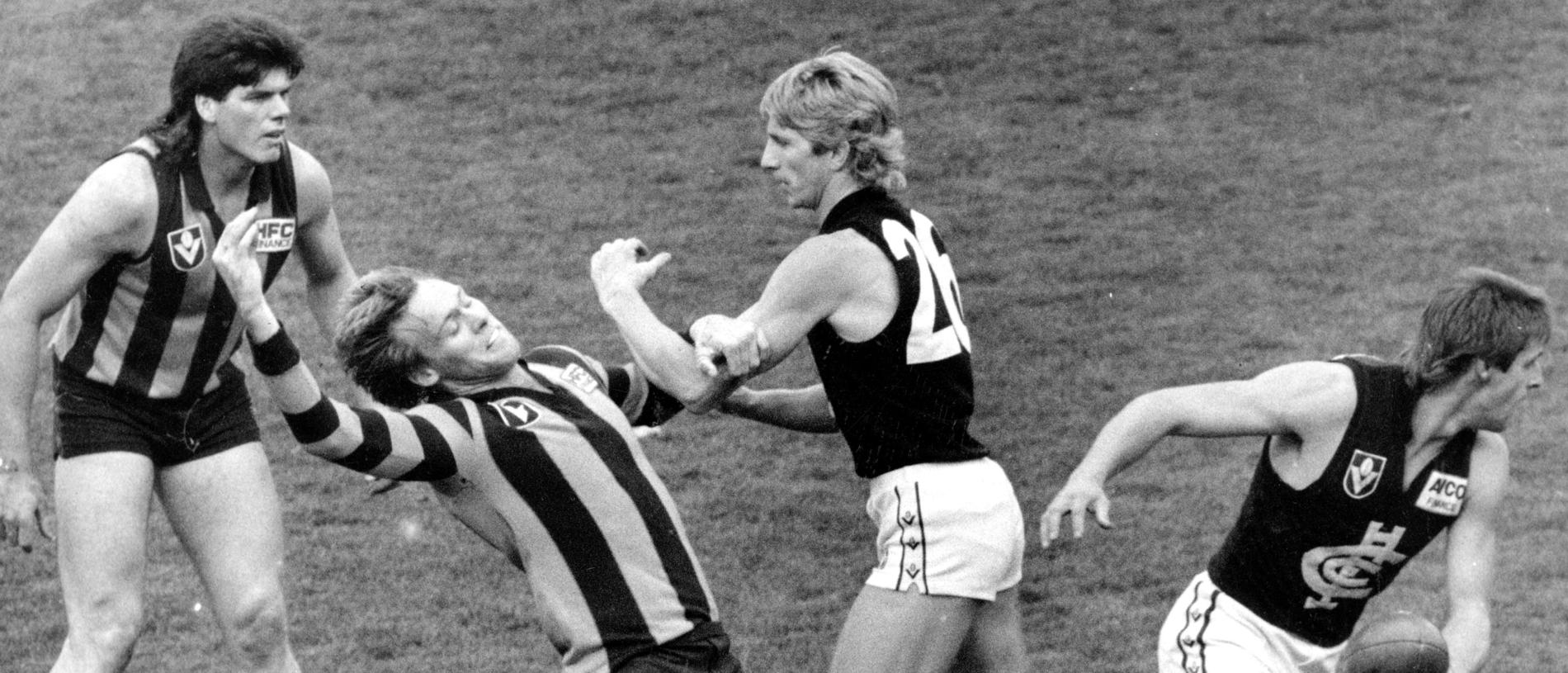
“Just forgetting things. Forgetting names and different things.”
Biggest hit?
“Banksy’s (Collingwood’s Denis Banks). I woke up in the rooms, basically.”
What was the cause of that?
“I split his eye open before that, probably about 10 minutes beforehand. I knew he was coming, I just wish I had seen him coming. As soon as I did it, because I knew he could handle himself alright, I thought, ‘Oh sh**. It wasn’t a very smart idea that’. It was only a little glancing elbow but his eye just popped right open and split like a watermelon. I knew I’d made a mistake and was certainly made to pay for it.”
Any regrets?
“That was part and parcel of the game. I built a rod for my own back because players and coaches would send players out because they thought they could suck you in or get you off your game – and in various ways get me revved up instead of playing footy.
“It was just the era we played in and what you had to put up with, but a weakness of mine was seeing I could be put off my game in a physical sense.
“Quite often you’d get sick of it and you’d fire back. Back in our day there were blokes who were trying to take you out, and at times you were trying to take other players out. If you could put them on a stretcher and send them off the field you’d do it – and vice versa.”
Do you regret some of the things you did?
“Of course you do. But you can’t undo them, either. That’s just what we did back then. You were prepared to pay a price and put your body on the line and do whatever it took at times to get over the line.”
LEIGH MATTHEWS, 332 GAMES FOR HAWTHORN (1969-85)
“I guess I look back. The game has moved well as the information evolution has changed, so the game has tried to react to that.
“Back when I played you kind of felt your head was hard enough and if you got your head in the road and you got a free kick, that was worth the price. That was probably the attitude we had.
“(But) as the rules have been tightened up to make head contact less prevalent, it means the self-awareness of not putting your head in a dangerous spot is (diminishing).
“Standing under the ball used to be terribly scary, but now, because of the rules you get some protection from the bloke behind you.
“We remember not that long ago you could get knocked out, carried off on a stretcher and come back on later in the game. So, the game is doing the best it can under the knowledge evolution that has been going on over the decades.”
How many times were you knocked out?
“In terms of lost time, I reckon I only had two where I lost some seconds. I never got carried off on a stretcher, but there were a couple of times where your consciousness came back to you 10 seconds after the incident happened.
“There was one at Victoria Park and one in a state game in South Australia. I can remember them both in way, but more the almost coming to consciousness on your feet. There is probably an element of the hard-head concept I suppose.”
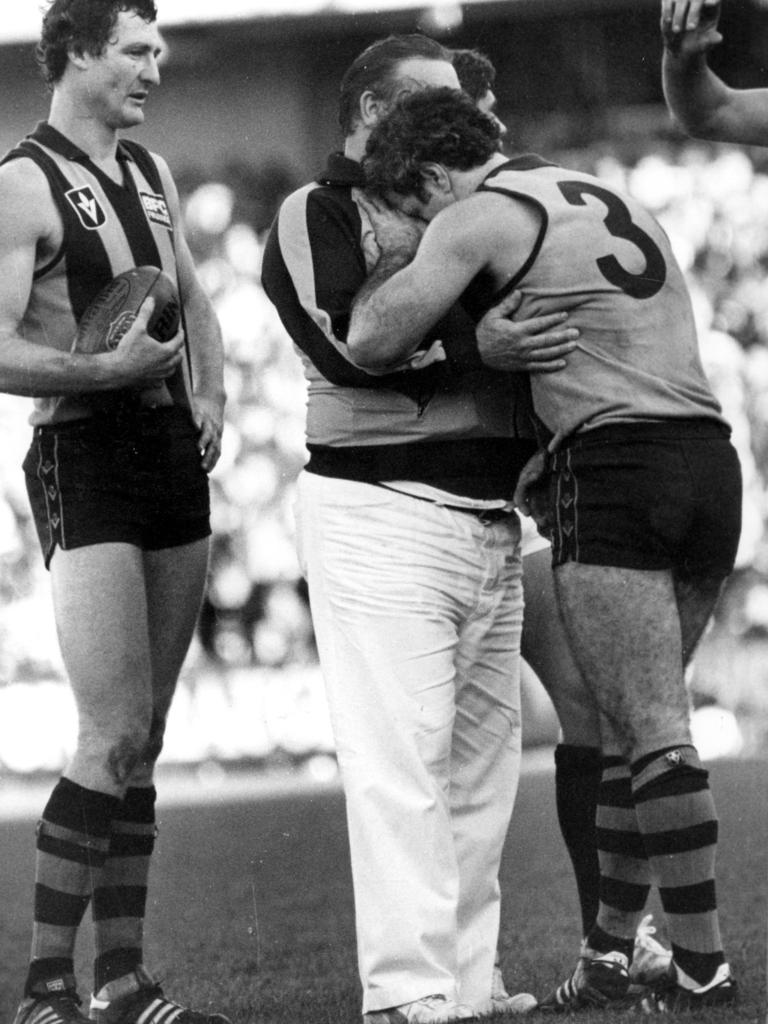
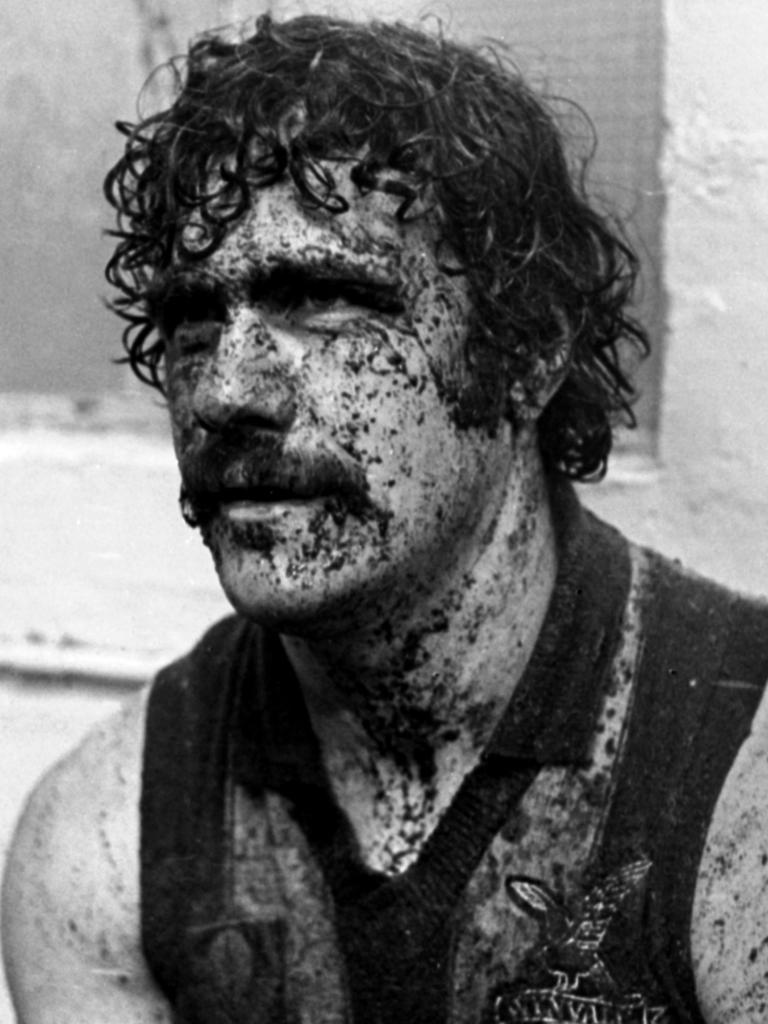
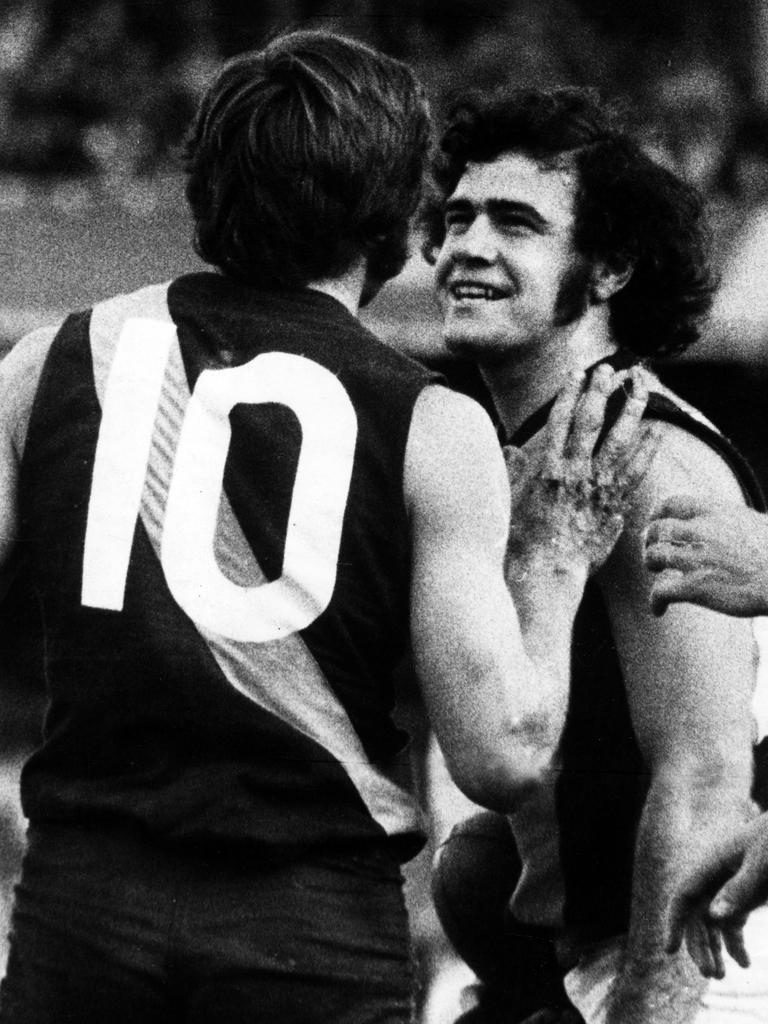
Do you regret anything you did – within the prism of what we now know?
“I inflicted a bit of punishment, that’s not so much a concussion thing, but I still regret many of the things where you damaged opposition players, because even back in that era, you didn’t want to damage someone so much that they got carried off. You regret that, but that’s not so much because of what we know now, I probably always felt that in all honesty.”
Any issues or cause for concern?
“No, I don’t think so. Not that I am aware of. There’s the ageing process that goes on with everybody, really, but I don’t think I’ve got any aftermath.
“But the other thing they do say is that you can get heaps of knocks to the head that might have just dazed you – and they are numerous. And this is the thing that took us a while to understand – you can get knocked out cold or get a relatively insignificant glancing blow.”
Would you be happy for your grandkids to follow in your football steps?
“I’ve got a grandson who is 16 who plays footy. And I sometimes wonder, as life is going on, about where is physical-contact sport going? In 50 years’ time for instance, you think that the heavy physical contact codes, which is AFL, rugby league and rugby union – they are the heavy ones, where is it all going in a few generations’ time? But there’s a risk in driving cars, too.
“It’s a matter of how much risk are you minimising in your life? It’s not an easy question to answer.”
MATTHEW LLOYD, 270 GAMES FOR ESSENDON (1995-2009)
“I had one really serious concussion in a final. A head clash with Adam Hunter. I was extremely sick. His head hit me in the temple. I was vomiting blood and was told it was due to the brain trauma.
“I was out before I hit the ground and then smashed my head into the ground. Doc Reid rolled me onto my side and that was because the blood trickles down your throat and that’s how people often choke.
“I can’t remember coming to until I was in the ambulance. I remember Lisa crying in front of the ambulance asking, ‘Will he be alright?’ and quite humorously, ‘Will he remember he is going to marry me later in the year?’
“I was just so sick and walked around feeling groggy for probably two weeks. We won that final, but I didn’t play the next week and I don’t think I would have played the week after in a prelim either. I did not feel good. I felt unsure of myself at times and from a memory perspective for a period of time.
“That was my biggest one but we all have those little ones where you are punched in the back of the head going for a mark where I was probably slightly concussed, but back then you just ploughed through it.”
Any mental health concerns now?
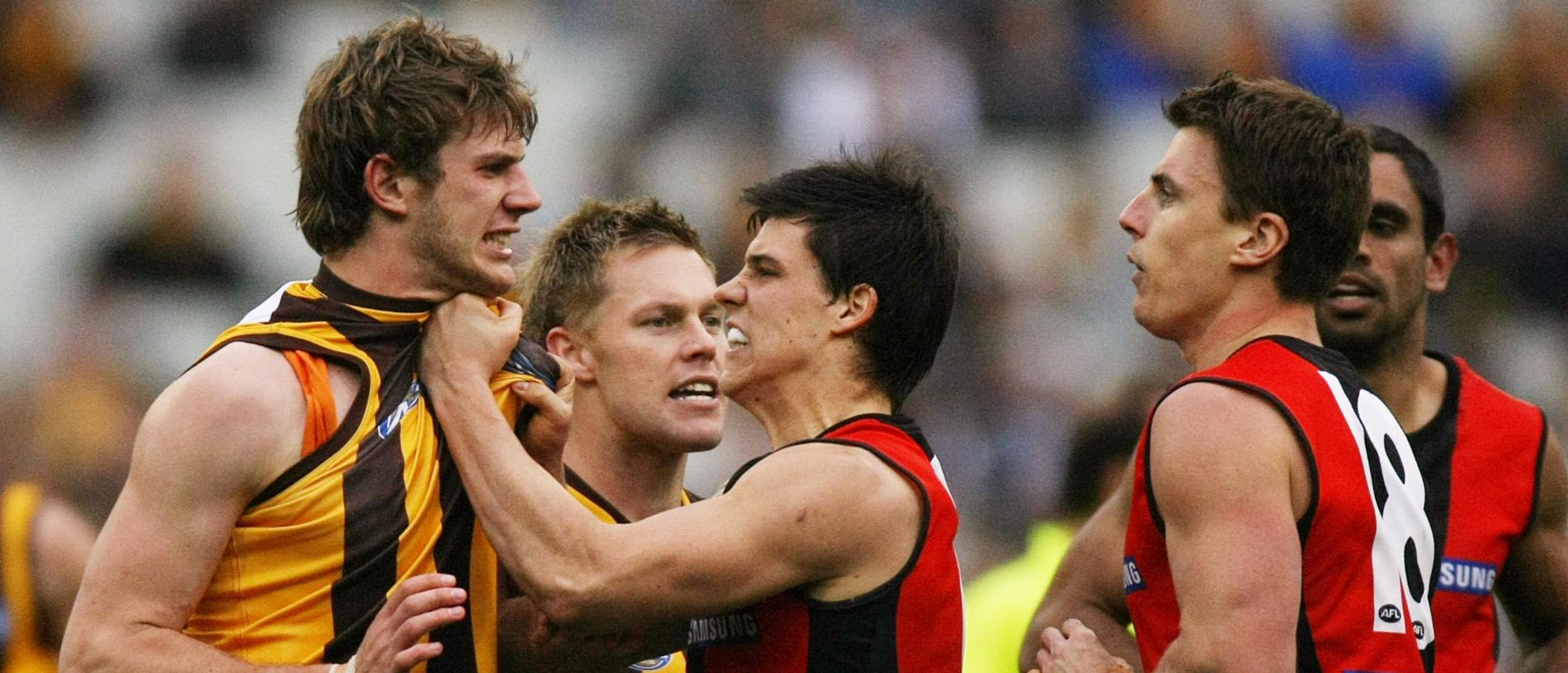
“Not at this point in time.”
Any regrets about dishing out hits? You famously took out Brad Sewell with a bump.
“No, I don’t. Every hip and shoulder that I set upon was to hit players in the body – I never intended to hit them in the head. It’s a split second decision that you make at the time, and occasionally you do execute poorly. So I guess if Brad Sewell ever had long-term damage down the track, well you would feel a little bit of guilt, but at that period of time, it’s a hard game, it’s a physical game and I just executed that one wrong.
“If you don’t play with that physicality, you don’t last too long, particularly as a key forward.
“I was getting physically worked over (as a younger player) a lot and those stronger types at the footy club, Sheeds (coach Kevin Sheedy) and Harvs (teammate Mark Harvey) were big about not letting the competition walk all over me. That’s how I was brought up to play through the 90s, and I know times have changed, but if someone drops back in the hole they’ve got a fear going back next time around.
“And I think still, if someone drops back in the hole you are entitled to drive your knee in and go for your marks that way. Every forward still needs to play with that mongrel – without the physicality of the hip and shoulder.”
JIM JESS, 223 GAMES FOR RICHMOND (1976-88)
“I got knocked out four times and there were plenty of smaller ones. I don’t know whether it’s an age thing, but I do forget a lot of sh**. Some of the most simple, mechanical things, I just can’t get my head around.
“I’m 66 but I did run into a couple of good ones (hits).”
Did you give any out?
“Oh, sh** yeah. It ended up about square. Garry Wilson cleaned me up a ripper at the ‘G right in front of the Southern Stand. I’d sort of run into him the year before and dislocated his shoulder or something. I left myself wide open and he got me a beauty.”
Biggest hit you dished out?
“Probably Kenny Hunter in the 1982 grand final. That was fair and square. He says he doesn’t remember much about the game, so he was pretty well out to it. He went off but he came back on later in the game.
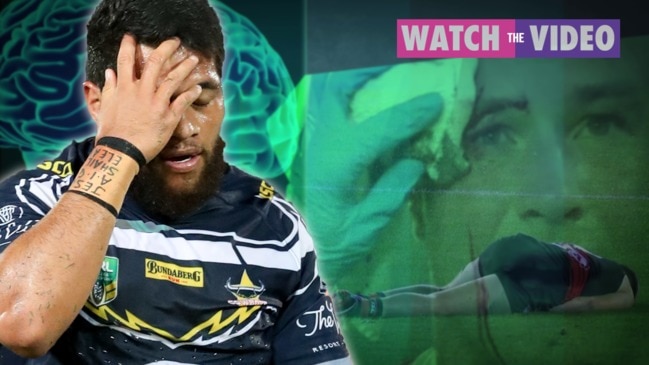
“Rhys-Jones gave me a few stitches in my scon one day at the SCG.
“But it was expected in those days.
“You knew that you were probably going to wear one, but that was just a part of the game. “We would have a beer after the game and it was ‘see you next time’.”
Any regrets?
“To play for the Tigers and win a premiership, I’m happy to pay a price, but if I was in Danny Frawley’s shoes, then you’d regret it. I feel terribly sorry for Danny and Shane (Tuck). But in our day, every time you ran out you knew that if you stuck your head out someone was going to belt you.
“You just had to keep running at the ball … most of us did, but these days it has become so sanitised – we were half aware that we might get one so you’d brace yourself a bit – but you see some fellas now and they just get cleaned up. There is no awareness a lot of the time.
“When danger fronts, they don’t know how to deal with it or avoid it.”
ROBERT DIPIERDOMENICO, 240 FOR HAWTHORN (1975-1991)
“We all went out and played the game within the rules that we all knew at the time.
“I mean I would hate to have been a forward back in the day because they just got smacked in the head at every moment.
“The game today is completely different, and it’s funny, but I think we see more concussions today than back in the day.”
DiPierdomenico agrees with the theory that players today are not as aware of protecting themselves.
“I look at the injuries we all had – and I had nearly 20 operations – but they were more about having my ears sewn back on, my finger sewn back on or a punctured lung and broken sternums. You were body tough. We used to train one-on-one. Two against one. Body training, but today these guys don’t do one-on-one, they go up against bags. So we were body tough and we knew what was going on. We knew our bodies and how to protect ourselves and had an understanding of what was around us all the time.
“The worst thing was, when I think about it now, is that we were all sent back out there (after copping head knocks).
“The more blood you had on your jumper, it made you as a player in a way.”
He recalled being a boundary rider for Channel 7 when Alan Richardson got hit by Michael Voss at the Gabba in 1996.
“I thought he was dead. I jumped out of my seat. Wally Lewis was sitting next to me and even he cringed,” he said.
“Back in our day you could shepherd a teammate, but when Koschitzke got hit that changed the game completely.”
He estimates he copped three or four concussions.
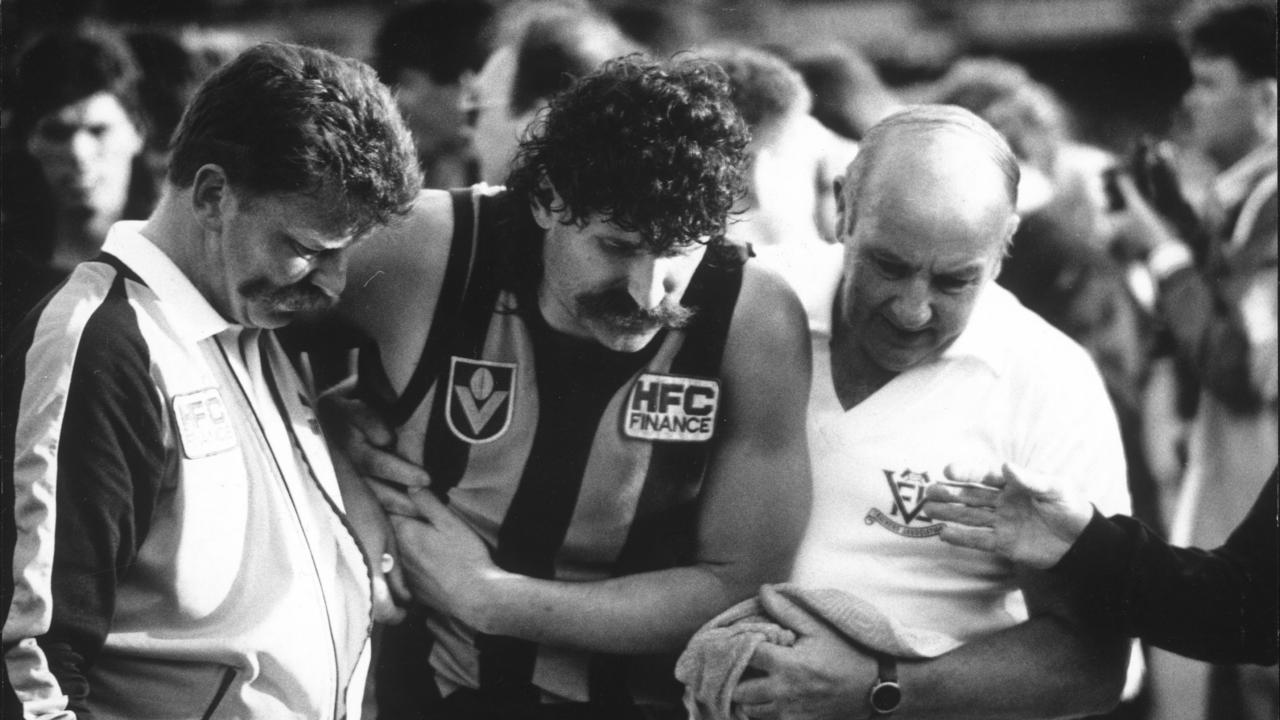
“There was one out at Essendon. I got pretty badly beaten up by the boys out there. I think it was a bit of retaliation with what happened with Alan Stonehma.
“I knew exactly what was going to happen. They got me back.
“I was on the bench and trying to get back out there, which I did.”
Do you worry about your mental health?
“It’s funny that you say that but as you get a bit older, I don’t remember things. But is it because of that? Sometimes you think, ‘Hmm. Interesting’. I know that I’m OK, but time will tell. You worry about it because those 60s and 70s and 80s players were battered. There is no doubt about it – off the ball, on the ball.
“When you think about Spud and Shane Tuck, it really hits home. Johnny Platten was such a great player but just in the packs all the time. There are going to be a few more and I’m thankful for the AFL trying to do something about it.”
The Alan Stoneham incident. Do you have any regrets?
“You didn’t go out there to inflict pain on people. You went out and played the game, but that was the game. Three wasn’t a time where you were thinking, ‘I’m going to come out and get you’. But within the game, you could go out there and if someone was shepherding you could come in from the side and knock them off or whatever.
“I remember (the Stoneham incident) like yesterday. I was playing on the wing, it was just before half-time, and the ball came out over to where my wing was, and the siren went for half-time, everyone slowed down, but Alan was coming from the half-back line straight at me and I put one foot out and one elbow up and that happened. When I saw him I thought, ‘Oh my God’. I went down to see if he was OK and the whole scuffle started.”
It was an accident?
“There’s no doubt about it. But I couldn’t believe that Alan Stoneham came back out (in the second half).
“I’m really disappointed for Alan (with his mental health issues) but it happened and I’m hoping he and other players can get the right treatment. I felt a little bit sick about it but it was 38 years ago, what can I do?”

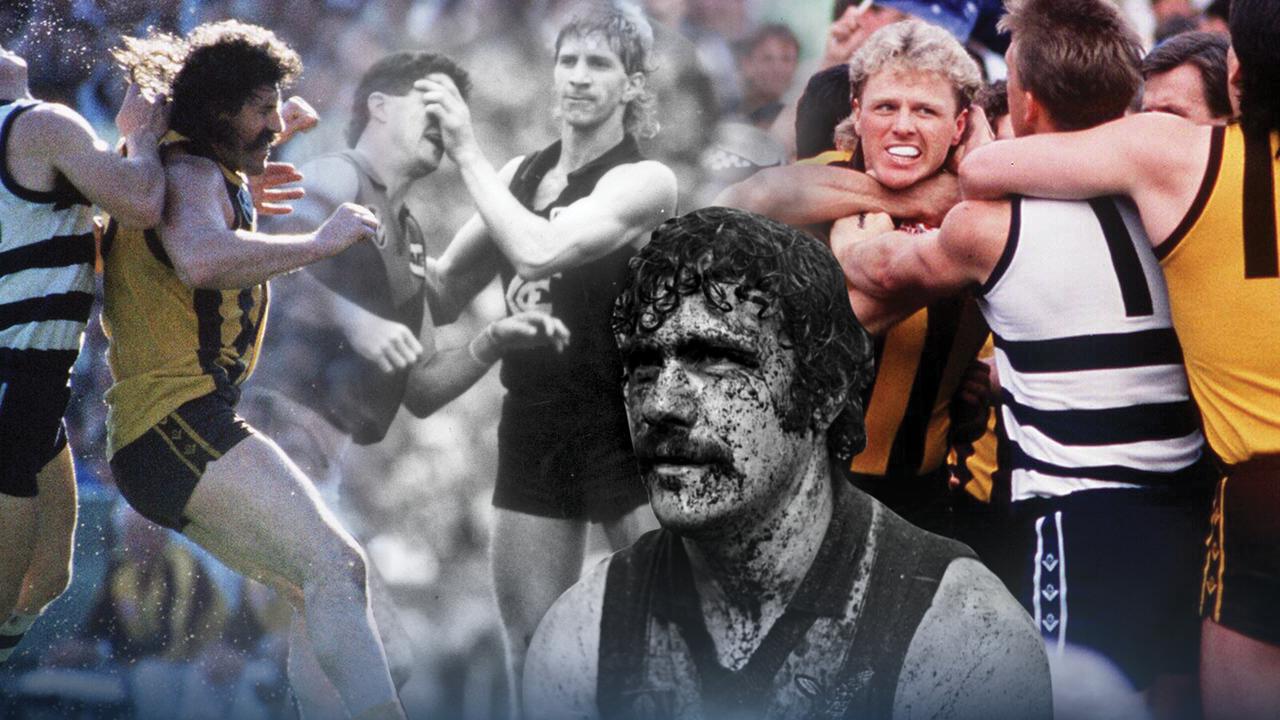
Add your comment to this story
To join the conversation, please log in. Don't have an account? Register
Join the conversation, you are commenting as Logout
‘Every year’: Calls for annual All-Stars game
The AFL Indigenous All-Stars squad is sure to provide plenty of highlights when they come together for the first time in a decade and the players involved want to do it every year.
‘Getting into him’: Roos wait on $8m man’s call
When the media reports your teammate is being offered the biggest deal in the club’s history, there’s going to be some ribbing.